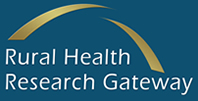12:30 - 4:00 PM
Gwen Martin, Ph.D., Evalytics LLC
Becky Melzer, M.A., Evaluation Edge LLC
Leticia Manning, RHND Program Coordinator, HRSA/ORHP
At the conclusion of this workshop, participants will be able to define evaluation outcomes, evidence-based outcomes and difference between the two; know the process of creating and incorporating appropriate outcomes into their programs and organization; and, understand the value of measurement to improving and growing their health network.
Both Martin and Melzer are nationally recognized evaluators with many years of experience in program evaluation and research and are currently working in health care and health network areas. The workshop will be highly interactive, use examples from health networks and provide ample time for questions and discussion.
Participants will learn:
- What program evaluation outcomes are and how to create appropriate ones.
- What evidence-based outcomes are and how they are differentiated from traditional outcomes.
- Why evidence-based outcomes are important and why outcomes in general are critical to sustaining and growing a health network.
- How to create and incorporate appropriate outcomes for one of their programs (the process).
- When to begin thinking about program evaluation outcomes.
Participants will be presented with:
- Information from HRSA about the move toward evidence-based outcomes in their grant-making.
- Information and examples of technological tools – dashboards – that can bring multiple programs’ outcomes together strategically.
Melzer and Martin have collaborated on numerous projects over the past eight years. They bring energy, insight and common sense to the often-misunderstood elements of program evaluation and research, adding value in all stages.
Pre-Conference Workshop Registration Fee: $50 for NCHN members; $75 for non-members
» about Gwen Martin, Ph.D.
» about
Becky Melzer, M.A.
» about
Leticia Manning
» about
Toniann Richard
4:00 - 6:30 PM
2013 NCHN Board of Directors Retreat
6:30 - until the fun must end
Welcome Reception
(Guest tickets are available for purchase during registration. These must be purchased in advance during online registration to guarantee space for your guest.)
Registration Open
8:00 - 9:00 AM
Networking Breakfast & NCHN Annual Membership Meeting (Heather Fuller, NCHN President)
9:00 AM
NCHN Board of Directors Meeting (Heather Fuller, NCHN President)
9:15 AM - 11:30 AM
Welcome & Keynote Presentation
Welcome from Gerrelda Davis, Director, Bureau of Primary Care & Rural Health, Louisiana Department of Health & Hospitals' Office of Public Health
Partners in Health Network (Bob Whitler, WV)
Santa Cruz Adolescent Wellness Network (Cassalyn David, AZ)
Tennessee Rural Partnership (Cindy Siler, TN)
Montana Health Network (Chris Hopkins, MT)
Sunflower Health Network (Heather Fuller, KS)
Northcentral Montana Healthcare Alliance (Jack King, MT)
Southeast Texas Health System (Shannon Calhoun, TX)
HCC of Rural Missouri (Toniann Richard, MO)
Arizona Rural Women's Health Network (Kimberly Zill, AZ)
The Hospital Cooperative (Jon Smith, ID)
Western Healthcare Alliance (Jessica Taylor, CO)
In the long history of organizations—beginning when we first formed small tribes to survive—the network is the newest, the most powerful, and, at the same time, the oldest form of organization. How can the network motivate people—and organizations—to take risks and do what they cannot do alone? How can networks become powerful magnets to attract others and spur participation? How can members of networks compete and cooperate at the same time? How can everyone—and every organization—in the network become a leader? And how can we think differently about evaluating and measuring networks?
In this talk, combined with question and answer, we’ll put our heads together to address these issues and leave the morning session with a new understanding of the power of networks.
Jessica’s research and practical experience have taken her around the world. Among the clients for whom she has delivered training, seminars, and consulting: Alberta Health Services, American Management Association, Assurant, Apple, AT&T Universal Card Services, BankBoston, The Brookings Institution, Cisco, Credit Suisse, Digital Equipment Corporation, Dudley Street Neighborhood Initiative, General Electric, Fidelity Investments, Fiserv, Hewlett-Packard, Hyatt Hotels, IBM, Intel, Kerr-McGee, Marriott, National Association of Corporate Directors, National Education Association, NCR, Omgeo, PeopleSoft, Pfizer, Presbyterian Church (U.S.A.), Qantas, Roche, Royal Dutch Shell, Steelcase, Tetra Pak, The United Nations, The White House, U.S. Army, U.S. Joint Forces, Visiting Nurse Service of New York, Volvo, and the Wisconsin Technology Initiative.
With Jeff, Jessica literally wrote the book on Networking (Doubleday) and on Virtual Teams (Wiley)—along with four other books, including The TeamNet Factor and The Age of the Network—that have been translated into many languages. Noted writing includes “Why BP Crashed and Killed the Gulf” (Harvard Business Review Blogs); “The Virtual, Networked Organization” (in The Handbook of High Performance Virtual Teams, Jossey-Bass); “The Strange Beauty of Virtual Teams;” “The Easier Way to Work: Collaborating in World- Class Virtual Teams;” and “Communicate, Collaborate, Coordinate, Decide: How IT Achieves Strategic Leadership.”
The landmark article, “Can Absence Make a Team Grow Stronger?”, Harvard Business Review, which Jessica and Jeff wrote with two business school professors, reported on best practices in “far-flung” teams and is included in HBR’s 10 Must Reads on Teams. Jessica and Jeff also served as mentors for the Harvard Business Press Pocket Mentor Leading Virtual Teams. And, Jessica served as subject-matter expert for American Management Association’s course on leading virtual teams.
VCW will be broadcasting this session via live streaming video. To find out more or to join the webcast, download the flyer (pdf)
11:45 AM - 1:00 PM
5th Annual NCHN Awards Luncheon
1:00 - 3:00 PM
Marcia Green, RHITND Program Coordinator, HRSA/ORHP
*Learning Objective 1: After this presentation, attendees will gain awareness of strategies used by successful HIT networks in the development their networks.
*Learning Objective 2: After this presentation, attendees will understand how to communicate the rules and regulations surrounding health IT to their membership, and plan how they can best support members.
*Learning Objective 3: After this presentation, attendees will have heard from their peers and fellow NCHN members about the work they are doing to meaningfully impact health IT adoption in their rural communities.
Chrysanne Grund, Project Director, Greeley County Health Services, KS
The rural communities in far western Kansas are geographically isolated from major metropolitan areas. What they lack in population is made up in cooperation as community based healthcare providers from different services work together to care for patients. The network includes a critical access hospital, two rural health clinics, a local pharmacy, health department and volunteer EMT groups. The implementation of health information technology will enhance work processes but it is the existing relationships that really make the partnership work.
Representatives from our multidisciplinary team will share strategies and best practices for working together effectively with limited manpower and multiple obligations.
Learning Objectives:
- Unique strategies for communication – email, internet, text, web based strategies
- Cooperative strategies to removing duplicate work processes
- Manage Community events and special projects – health fair, county fair, recruiting, mentoring, school physicals, Healthy moments, Integrated Behavioral health
- Your regulation is my regulation – how can we work together to share the burden of regulations with a limited work load? - CHNA, meaningful use, disease reporting, heart safe community
» about Chrysanne Grund
» about Dr. Wendell Ellis
» about Lisa Moritz, RN
» about Chris Baber, EMT
3:30 - 5:00 PM
Breakout Groups by Network
6:30 - 9:00 PM
Steamboat Natchez - Dinner Jazz Cruise
(Guest tickets are available for purchase during registration. These must be purchased in advance during online registration to guarantee space for your guest.)
2013 President’s Breakfast
8:30 - 10:30 AM
We are also in a period when mergers, consolidations, and similar steps to integrate previously separate healthcare organizations are on the rise. A side effect of this trend has been increased federal antitrust scrutiny and enforcement. Combining any two previously independent competitors increases the market power of the combined entity, and can have potentially anticompetitive effects, and thus trigger antitrust challenges.
In short, healthcare networks and their members can unwittingly find themselves “targets”. The best protection is knowledge of the laws and the specific conduct that needs to be avoided.
The purpose of this Interactive Workshop is to arm you with the knowledge to avoid “risky” conduct and to provide practical “best practices” to avoid inadvertent mistakes and assure that your organization doesn’t need to say, “But officer, I didn’t really mean . . . “ to cross the antitrust line.
11:00 AM - 12:00 PM
Network Leader Sharing Session
1. What are value propositions and why are they important to integrated vertical health networks?
2. What are the challenges to developing value propositions for integrated vertical health networks?
3. Participants will review and experiment with a step-by-step worksheet they can use to create value propositions in their own network.
The key take-away from this mini-workshop will be a step-by-step outline networks can follow to craft their own value propositions to members, funders, or any audience.
Gail Emrick, Executive Director, Southeast Arizona Area Health Education Center
Established and emerging networks can benefit from I-STAR’s methodology, designed to assess network core competencies including: network learning, planning, administrative quality, advocacy, resource generation, and leadership. Gail Emrick, Director of the Southeast AZ Area Health Education Center (SEAHEC), has used this method with Networks as diverse as the binational Arizona Border Communities Health Network to rural Latin American reproductive health and development agencies.
She discusses its value as a Network and organizational capacity building tool.
Learning objectives:
- Why is it important for networks to engage in self-evaluation ?
- What is the I-STAR methodology and how can it be adapted to my network?
- How the I-STAR’s standards for highly functioning organizations and networks can clarify strengths and challenges and lead to consensus around priorities and action steps.
Participants will gain an understanding of I-STAR and how they might adapt it for their network as well as an example of one of I-STAR’s tools.
AgriSafe formed a formal network so that services could be seamlessly adapted at the local, state and national level. During the last three years, AgriSafe launched a state-based initiative to prepare a workforce of rural providers in the field of occupational agricultural health. Clinical resources, advanced training programs, outreach services and distance education are core components of this innovative occupational health initiative.
AgriSafe fosters partnerships with universities, agribusiness, media organizations, church & civic organizations, agricultural extension, mental health practitioners, and other service professionals. AgriSafe’s collaborative approach to public health care delivery demonstrates how critical it is for diverse organizations to work together to bring the best preventive services to at-risk populations and should be considered a model for agriculturally-based communities throughout the nation.
Objectives of the session:
- Identify state and local champions who can retain their organizational identity while supporting your mission.
- Maintain creative brand identity among a competitive non-profit environment
- Recognize funding opportunities that support national movements with state affiliations
12:00 - 1:00 PM
Networking Lunch
Roundtable Discussions
1:15 - 2:30 PM
Concurrent Sessions
Montana was an early adopter of telemedicine but current structures are limiting progress in the state. The presenter can discuss the pluses and minuses of telemedicine implementation from a state perspective.
Secondly MHN has taken a planning grant and been able to move it forward and can discuss what that took to achieve the stated goal for the planning grant.
Third MHN will discuss its primary care telemedicine program which has been set up in a rural environment (on a shoestring budget) based on part time people supporting sole community providers.
Diane Gasaway, Executive Director
Stakeholders in NCHN can be the glue that holds communities together. This presentation will introduce how fostering cooperatives in their communities can potentially improve the quality of life for their clients in a number of ways. By encouraging the development of cooperative access to resources and services NCHN can help people take control of their futures. NWCDC will share its strategies and tools for supporting semi- grassroots initiatives.
The presentation will discuss innovative cooperative solutions such as mobile home community conversions to cooperative ownership, the multi-stakeholder approach to cooperative home care, and shared service cooperatives.
2:30 - 3:00 PM
Break
3:00 - 4:15 PM
Concurrent Sessions
Dave Johnson, Director of Member Relations & Business Development, Rural Wisconsin
Board communication can be a challenge for any network. How much is too much? What if I'm not giving them enough? How can I get my board members to respond to my requests when they are not in a board meeting? Providing the right information, the right way, at the right time is key to keeping your board engaged outside of your boardroom.
Participants will learn some strategies for effective board communication, including;
- Understanding the basics
- Implementing a communication plan
- Keeping it meaningful and consistent
- Fostering two way communication
- Examples of documents, formats, etc.
Eileen Tremaine, MPA, Program Director, 299 Health Collaborative
Six rural health programs, two FQHCs, one RHC, and three CAHs, are developing a system of care that increases their patients' access to specialty care providers through the development of a regional health collaborative, the CA299 Health Collaborative. The Collaborative has worked to: collectively identify the specialty care needs of their community members; seek input from the regional specialty care providers on systems of providing care that would structurally work, that would meet the patients' needs and area health care organizations' needs; establish joint contracting with all organizations; and collaboratively schedule with the specialists. This system of care incorporates the primary care providers' desire for patient access, the hospitals' financial incentives for increased utilization, and the specialty care providers' business demands of financial viability and guarantees, ease of scheduling, and collective contracting.
The presentation will outline the steps one group of health care providers is taking to develop a specialty care program to improve access for their patients in addition to increasing the utilization of the area's hospitals. Learning objectives include: needs assessment and referral projections; funding sources for this planning process; steps taken to establish the program including the Request For Information (RFI), attorney and financial consultant services; contracting and scheduling structures; and preliminary program outcomes.
4:15 - 5:15 PM
Plenary Session
Sally Trnka, Senior Program Coordinator, NRHRC
Randy Jacobs, TAG Healthcare Marketing
Marketing our network to current and potential members is something that we all do…or it’s on a ‘to do’ list…or we know we should do it…or we haven’t thought about it at all. Regardless of which category you fall in to, come join us at this session as we walk through how to create and implement an effective network marketing plan.
The session will include a discussion of the critical components of a marketing plan, including: competitive analysis, competitive advantage, defining your target market, and developing a value proposition. The work required to complete each component will also be covered. Handouts and activities will be provided to participants so they can begin to create their own strategic marketing plan for their network.
This will be an interactive session from which participants can take the concepts they learn and apply them, with the provided tools, directly to completing/rejuvenating their own marketing plan.
» about Sally Trnka
» about Randy Jacobs
» about Stacie Pace
Dinner on Your Own
NCHN Leadership Learning Communities Workshop (BULLS & Transformers)
7:30 - 8:45 AM
Networking Breakfast
8:45 - 10:30 AM
Today, NCHN member networks and their strategic partners are asked to accomplish more with less. And like all employers, you need to find ways to manage costs, boost productivity and improve overall efficiency. Your single best strategy to meet today’s challenges and achieve these outcomes is to improve the health and well-being of your most important resource, your human capital—the real people living real lives who enable you to fulfill your mission.
Sustainable lifestyle behavior change occurs when individuals and organizations are actively engaged in honest, positive and empowering conversations about health and well-being. This isn’t just theory. For the past seven years, LoneStart Wellness has partnered with the Texas Organization of Rural & Community Hospitals to promote these conversations in rural communities across Texas. We’ve shown that most people will join a voluntary movement to improve their health and that of their families so long as they believe they are receiving valid information, have genuine organizational support and can have the realistic expectation of success.
10:30 - 10:45 AM
Break
10:45 - 11:45 AM
Federal Update: Legislative & Regulatory
Leticia Manning, Public Health Analyst, Office of Rural Health Policy - Community Based Division
11:45 AM - 12:00 PM
Closing of 19th NCHN Conference
Door Prizes

2013 Keynote Speaker Program Donors
Partners in Health Network (Bob Whitler, WV)
Santa Cruz Adolescent Wellness Network (Cassalyn David, AZ)
Tennessee Rural Partnership (Cindy Siler, TN)
Montana Health Network (Chris Hopkins, MT)
Sunflower Health Network (Heather Fuller, KS)
Northcentral Montana Healthcare Alliance (Jack King, MT)
Southeast Texas Health System (Shannon Calhoun, TX)
HCC of Rural Missouri (Toniann Richard, MO)
Arizona Rural Women's Health Network (Kimberly Zill, AZ)
The Hospital Cooperative (Jon Smith, ID)
Western Healthcare Alliance (Jessica Taylor, CO)














